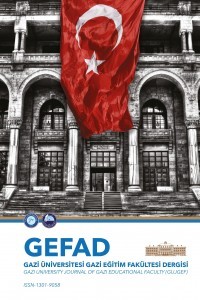Türk Edebiyatı Derslerinin Ruhsal (Bütüncül) Zekayı Geliştirmeye Yönelik İşlenmesine İlişkin Öğretmen ve Öğrenci Görüşlerinin Değerlendirilmesi
Ankara il merkezinden bulunan ortaöğretim okullarındaki 10. sınıf öğrencilerini ve bu öğrencilerin derslerine giren Türk Dili ve Edebiyatı dersi öğretmenlerini kapsayan bu çalışmada, öğretmenlerin Ruhsal (Bütüncül) Zekayı geliştirmeye yönelik ders işleme beceri ve tekniklerini uyguladıklarına ilişkin görüşleri ile aynı konudaki öğrenci görüşleri karşılaştırılmıştır. Anket soruları öğretmenlerin derste kullanabileceği 36 beceri ve tekniği içermektedir. Araştırmanın örneklemini Ankara il merkezinde bulunan ortaöğretim okullarındaki 540 10. sınıf öğrencisi ve bu öğrencilerin derslerine giren 31 Türk Dili ve Edebiyatı öğretmeni oluşturmaktadır. Öğretmen cevaplarının tutarlılığını ölçmek amacıyla örneklem grubundaki öğrencilere öğretmenlerinin belirtilen beceri ve teknikleri sergileyip sergilemediklerine ilişkin sorular sorulmuştur. Araştırmada ortaya çıkan sonuç, öğretmenlerin ruhsal zekayı geliştirmeye yönelik ders işleme teknikleri ile aynı konuda öğrenci görüşleri arasında anlamlı farklılık olduğunu göstermektedir
Anahtar Kelimeler:
Ruhsal zeka, Bütüncül düşünme, Edebiyat eğitimi, Öğretim yöntemleri
The Evaluation of Teachers' and Students' Opinions about Methods for Developing Students' Spiritual Intelligence in Turkish Literature Classes
The opinion of teachers and that of students with regard to methods for developing students' spiritual intelligence and teachers' abilities in this respect were compared in this study which was done with 10th grade students and their teachers in Turkish Literature classes. The questionnaires consist of 36 skills and techniques that can be used by teachers in the classroom. Sample group is composed of 540 students from 10th grade students in the high schools in provincial center of Ankara and 31 teachers attending their classes of Turkish Language and Literature. For testing the consistency of teachers' behaviors, students in the sample group have been asked whether their teachers were conducting certain behavior and techniques. The result of this study is that there is a meaningful level of difference between abilities of teachers and the opinion of students about these features.
___
- Balcı, A. (2001). Sosyal bilimlerde araştirma. Ankara: Pegem A.
- Deacon, T. (1997). Symbolic species: The co-evolution of language and the brain. New York: W. W. Norton & Company.
- Ergenç, İ. (1994). Beyindeki dil. Bilim ve Teknik Dergisi, Ocak, Cilt 275, Sayı 314, s.39.
- Karadeniz, A. (2006). Liselerde eleştirel düşünme eğitimi (Yayımlanmamış yüksek lisans tezi). Gazi Üniversitesi, Ankara
- Karasar, N. (2003). Bilimsel araştırma yöntemi. Ankara: Nobel.
- Llinas, R., & Ribary, U. (1993). Coherent 40-hz oscillation characterizes dream state in humans. Proceedings of the National Academy of the Science, USA. 90, 2078- 2081.
- Marshall, I. (1996). Three kinds of thinking. towards a scientific basis for consciousness, Ed. S. R. Hamerofl: A. W. Kaszniak, & a. C. Scott, MIT.
- MEB. (2005). Orta öğretim Türk edebiyatı dersi (9, 10, 11, 12. sınıflar) öğretim programı. Ankara: Millî Eğitim Bakanlığı.
- Oruç, N. (2008). Türk ve Avrupalı öğretmen adaylarının iyi öğretmen tanımlaması üzerine bir karşılaştırma. Gazi Eğitim Fakültesi Dergisi, 28(2), 149-168.
- Özdemir, S. M. (2005). Üniversite öğrencilerinin eleştirel düşünme becerilerinin çeşitli değişkenler açısından değerlendirilmesi. Türk Eğitim Bilimleri Dergisi, 3 (3), 297- 314.
- Pare, D., & Llinas, R. (1995). Consciousness and pre-consciousness processes as seen from the standpoint of sleep-waking cycle neurophysiology. Neuropsychologia, 33(9), 1155-1168.
- Ribary, U., Ioannides, A. A., Singh, K. D., Hasson, R., Bolton, J. P. R., Lado, F., Mogilner, A., & Llinas, R. (1991). Magnetic field tomography of coherent thalamocortical 40 hz oscillations in humans. Proceedings of the National Academy of Science, USA, 88, 11037-11041.
- Singer, W. (1999). Striving for coherence. Nature, 397, 391-393.
- Singer, W., & Gray, E. M. (1995). Visual feature ıntegration and the temporal correlation hypothesis. Annual Reviews of Neuroscience. 18, 555-586.
- Solso, R. L., Maclin, M. K., & Maclin, O. H. (2007). Bilişsel psikoloji (Çev. Ayşe Ayçiçeği-Dinn). İstanbul: Kitabevi Yayınları.
- Tutkun, Ö. (2011) 21. Yüzyılda eğitim programının felsefi boyutları. Gazi Eğitim Fakültesi Dergisi, 30(3), 993-1016.
- Yalçın, A. (2006). Türkçe öğretim yöntemleri. Ankara: Akçay.
- Zohar, D., & Marshall, I. (2004). Ruhsal zekâmızla bağlantı kurmak: SQ. İstanbul: Meta.
- ISSN: 1301-9058
- Yayın Aralığı: Yılda 3 Sayı
- Başlangıç: 1985
- Yayıncı: Gazi Üniversitesi
Sayıdaki Diğer Makaleler
Ayşe Sert ÇIBIK, Necati YALÇIN
Müzik Öğretmenliği Anabilim Dalı Öğrencilerinin İletişim ve Problem Çözme Becerileri
Müzik Öğretmenliği Programları KapsamındaÖzel Yetenek Sınavlarının Karşılaştırılarak İncelenmesi
Pelin Aşkin KUMOVA, R. Erol DEMİRBATIR
Mehmet Akif SÖZER, Kenan ALLAHVERDİ
Piyano Eğitiminde Süreç ve Ürün Değerlendirilmesinin Öğrencilerin Erişi Düzeylerine Etkisi
Ses Temelli Cümle Yöntemine Eleştirel Bir Bakış
Güreşçilerin Farklı Değişkenler Açısından Sürekli Kaygı Düzeylerinin İncelenmesi
